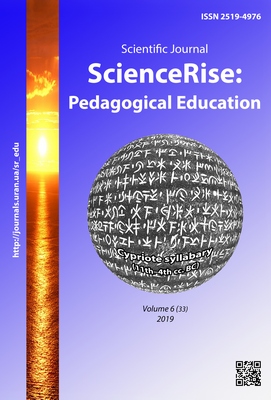Ontological principles of formalization of information sources in e-educational environments
DOI:
https://doi.org/10.15587/2519-4984.2019.186200Keywords:
e-environment, knowledge classification, computer ontology, ontology graph, transdisciplinary information resources.Abstract
The article deals with the knowledge-oriented approach in the formation of open e-learning environments, based on the concepts of ontology and transdisciplinarity. It emphasizes the need to search for new cognitive paradigms that would include classifications of knowledge, concepts, entities of scientific categories in the educational environment, especially in the open, computer-oriented one. It is noted, that one of the promising directions of further improvement of electronic learning systems is the development of methodological and logical bases for the design of educational systems on the basis of computer ontologies, on the basis of which the user is provided with a holistic, systematic review of a certain subject area - conceptualization of a certain branch of knowledge, which is provided through identifying the underlying objects and the relationships between them. It is determined, that the ontological approach provides the effective design of components of any knowledge-oriented information system. In this process, computer ontology acts as a valid mechanism for creating an open educational system that reflects a certain theory, presented as a set of terms, links, related descriptions and formal axioms, which facilitates the interpretation and sharing of these terms.
The technology of the TODAOS software complex, which is intended for the construction of educational local and network (distributed) systems, based on ontologies and context-semantic analysis (from the local ontologically-managed system of providing the educational process to the system of integrated multifactor analysis of educational information resources through the decision-making system and management of the process of knowledge formation) to ensure the interaction of all users of online information and educational environments. The ontological approach in filling the adaptive educational services of e-educational environments reflects the conceptual system of a certain disciplinary theory, and the methodological support of the educational-cognitive process consists in the assimilation of the conceptual system, axiomatics, rules, syntactic and morphological foundations of this theory
References
- Kremen, V. H. (Ed.) (2014). Synerhetyka i tvorchist. Kyiv: Instytut obdarovanoi dytyny, 314.
- Demianenko, V. B., Demianenko, V. M., Stryzhak, O. Ye. (2016). Vidkryta osvita u vyklykakh sohodennia. Navchannia i vykhovannia obdarovanoi dytyny: teoriia ta praktyka, 2 (17), 49–55.
- Moser, S., Zumbach, J., Deibl, I. (2017). The effect of metacognitive training and prompting on learning success in simulation-based physics learning. Science Education, 101 (6), 944–967. doi: http://doi.org/10.1002/sce.21295
- Bykov, V. Yu. (2008). Modeli orhanizatsiinykh system vidkrytoi osvity. Kyiv: Atika, 684.
- Demianenko, V. B., Demianenko, V. M. (2017). Ontological aspects of educational services of adaptive education. Naukovi zapysky. Natsionalnyi pedahohichnyi universytet imeni M. P. Drahomanova, 133, 68–78.
- Algarni, A. (2016). Data Mining in Education. International Journal of Advanced Computer Science and Applications, 7 (6), 456–461. doi: http://doi.org/10.14569/ijacsa.2016.070659
- Leach, J. (2008). Do new information and communications technologies have a role to play in the achievement of education for all? British Educational Research Journal, 34 (6), 783–805. doi: http://doi.org/10.1080/01411920802041392
- Brinson, J. R. (2015). Learning outcome achievement in non-traditional (virtual and remote) versus traditional (hands-on) laboratories: A review of the empirical research. Computers & Education, 87, 218–237. doi: http://doi.org/10.1016/j.compedu.2015.07.003
- Interactive simulations for science and math (2015). University of Colorado Boulder. Available at: https://phet.colorado.edu/
- Demianenko, V. B. (2017). Ontolohichna model merezhetsentrychnoho naukovo-osvitnoho seredovyshcha. Innovatsiini tekhnolohii navchannia obdarovanoi molodi. Odessa, 22–26.
- Pierson, A. E., Clark, D. B. (2018). Engaging students in computational modeling: The role of an external audience in shaping conceptual learning, model quality, and classroom discourse. Science Education, 102 (6), 1336–1362. doi: http://doi.org/10.1002/sce.21476
- Chandrasekaran, A., Linderman, K. (2015). Managing Knowledge Creation in High-Tech R&D Projects: A Multimethod Study. Decision Sciences, 46 (2), 267–300. doi: http://doi.org/10.1111/deci.12129
- Schuck, S., Aubusson, P. (2010). Educational scenarios for digital futures. Learning, Media and Technology, 35 (3), 293–305. doi: http://doi.org/10.1080/17439884.2010.509351
- Yalcin, N., Altun, Y., Kose, U. (2015). Educational material development model for teaching computer network and system management. Computer Applications in Engineering Education, 23 (4), 621–629. doi: http://doi.org/10.1002/cae.21636
- Man D. Ontologies in computer science // Didactica mathematica. 2013. Vol. 31, Issue 1. P. 43–46.
- Strizhak, A. E. (2016). Ontological textbook – paradigm of an interactive knowledge system in the educational process formation. Kompiuter u shkoli ta simi, 7 (135), 7–16.
- Strizhak, A. E. (2016). Knowledge Management – the main paradigm of modern education. Kompiuter u shkoli ta simi, 5 (133), 9–11.
Downloads
Published
How to Cite
Issue
Section
License
Copyright (c) 2019 Valentyna Demianenko

This work is licensed under a Creative Commons Attribution 4.0 International License.
Our journal abides by the Creative Commons CC BY copyright rights and permissions for open access journals.
Authors, who are published in this journal, agree to the following conditions:
1. The authors reserve the right to authorship of the work and pass the first publication right of this work to the journal under the terms of a Creative Commons CC BY, which allows others to freely distribute the published research with the obligatory reference to the authors of the original work and the first publication of the work in this journal.
2. The authors have the right to conclude separate supplement agreements that relate to non-exclusive work distribution in the form in which it has been published by the journal (for example, to upload the work to the online storage of the journal or publish it as part of a monograph), provided that the reference to the first publication of the work in this journal is included.







